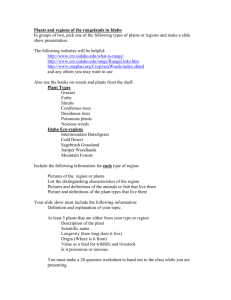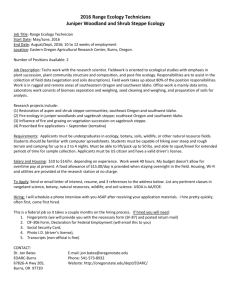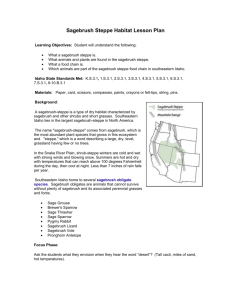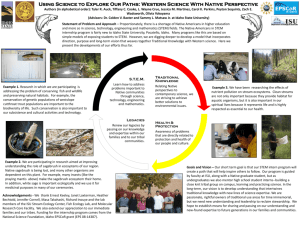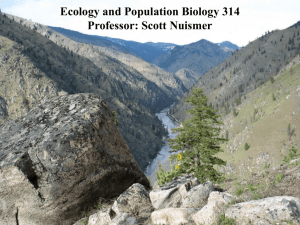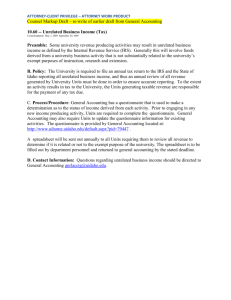Sagebrush Team PhD Assistantship Announcements
advertisement
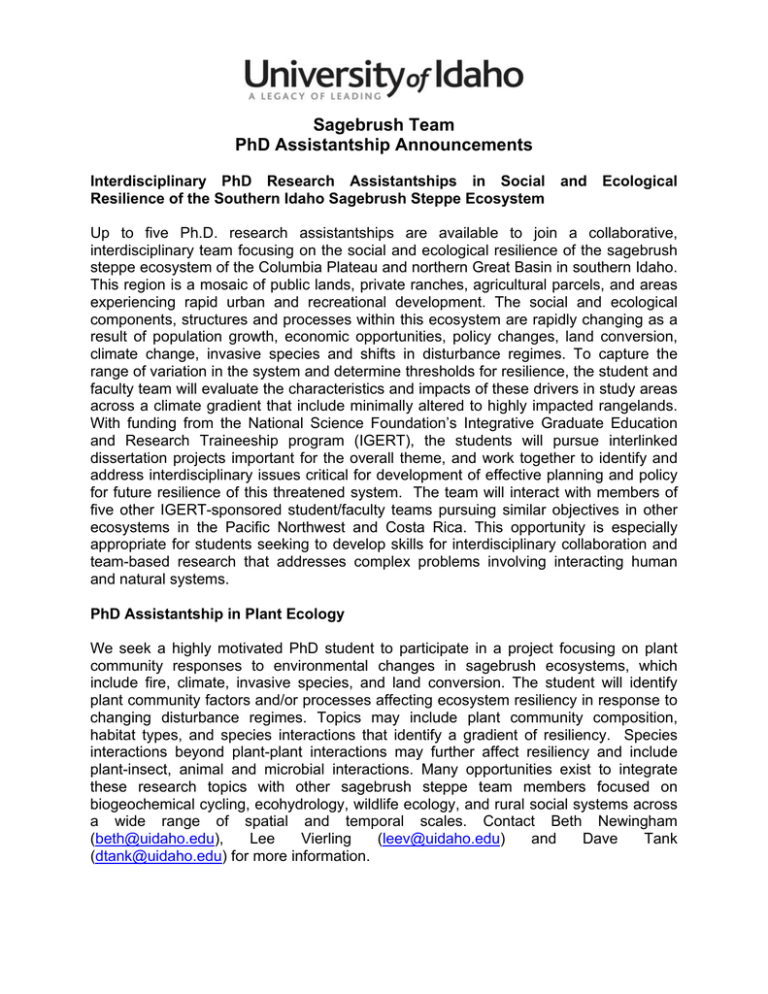
Sagebrush Team PhD Assistantship Announcements Interdisciplinary PhD Research Assistantships in Social Resilience of the Southern Idaho Sagebrush Steppe Ecosystem and Ecological Up to five Ph.D. research assistantships are available to join a collaborative, interdisciplinary team focusing on the social and ecological resilience of the sagebrush steppe ecosystem of the Columbia Plateau and northern Great Basin in southern Idaho. This region is a mosaic of public lands, private ranches, agricultural parcels, and areas experiencing rapid urban and recreational development. The social and ecological components, structures and processes within this ecosystem are rapidly changing as a result of population growth, economic opportunities, policy changes, land conversion, climate change, invasive species and shifts in disturbance regimes. To capture the range of variation in the system and determine thresholds for resilience, the student and faculty team will evaluate the characteristics and impacts of these drivers in study areas across a climate gradient that include minimally altered to highly impacted rangelands. With funding from the National Science Foundation’s Integrative Graduate Education and Research Traineeship program (IGERT), the students will pursue interlinked dissertation projects important for the overall theme, and work together to identify and address interdisciplinary issues critical for development of effective planning and policy for future resilience of this threatened system. The team will interact with members of five other IGERT-sponsored student/faculty teams pursuing similar objectives in other ecosystems in the Pacific Northwest and Costa Rica. This opportunity is especially appropriate for students seeking to develop skills for interdisciplinary collaboration and team-based research that addresses complex problems involving interacting human and natural systems. PhD Assistantship in Plant Ecology We seek a highly motivated PhD student to participate in a project focusing on plant community responses to environmental changes in sagebrush ecosystems, which include fire, climate, invasive species, and land conversion. The student will identify plant community factors and/or processes affecting ecosystem resiliency in response to changing disturbance regimes. Topics may include plant community composition, habitat types, and species interactions that identify a gradient of resiliency. Species interactions beyond plant-plant interactions may further affect resiliency and include plant-insect, animal and microbial interactions. Many opportunities exist to integrate these research topics with other sagebrush steppe team members focused on biogeochemical cycling, ecohydrology, wildlife ecology, and rural social systems across a wide range of spatial and temporal scales. Contact Beth Newingham Lee Vierling (leev@uidaho.edu) and Dave Tank (beth@uidaho.edu), (dtank@uidaho.edu) for more information. PhD Assistantship in Ecohydrology We seek a highly motivated PhD student to participate in a project focusing on the interactions between ecological and hydrological patterns and processes in sagebrush ecosystems undergoing changing disturbance regimes and anthropogenic influences, including climate change, invasive species, and land conversion. Resiliency to these drivers of change can be assessed by examining changes in water status and flux in the soil and plant environment, which may be mediated by soil-plant-microbial interactions. The sagebrush steppe team seeks a student interested in topics such as 1) effects of changing climate regimes (snow to rain-dominated) and/or 2) the effects of plant community structure changes on water dynamics and feedbacks on vegetation. These spatiotemporal dynamics include changes in snow redistribution, interception, evaporation, transpiration, sublimation, and soil water content and fluxes. Many opportunities exist to integrate these research topics with other sagebrush steppe team members focused on biogeochemical cycling, plant ecology, wildlife ecology, and rural social systems across a wide range of spatial and temporal scales. Contact Beth Newingham (beth@uidaho.edu), Tim Link (tlink@uidaho.edu), and Lee Vierling (leev@uidaho.edu) for more information. PhD Assistantship in Biogeochemical Cycling We seek a highly motivated PhD student to participate in a project focusing on biogeochemical responses to changes in the structure and function of sagebrush ecosystems, resulting from urban sprawl, climate change, invasive species and shifts in disturbance regimes. Quantifying changes in biogeochemical cycling is fundamental to understanding the resilience of sagebrush ecosystems as they respond to these drivers of change across spatial and temporal scales. We seek a student with keen interest in studying biogeochemical pools and fluxes of C, N and/or other nutrients in the context of developing indices for quantifying ecosystem resilience under a rapidly changing environment. Projects are encouraged that incorporate soil, plant, atmospheric, and/or microbial interactions. Many opportunities exist to integrate these research topics with other team members focused on ecohydrology, plant ecology, wildlife ecology, and rural social systems across a wide range of spatial and temporal scales. Contact Jodi Johnson-Maynard (jmaynard@uidaho.edu), Lee Vierling (leev@uidaho.edu) and Beth Newingham (beth@uidaho.edu) for more information. PhD Assistantship in Animal Ecology We seek a highly motivated and qualified PhD student to evaluate the resiliency of animal populations and communities occupying sagebrush steppe systems. This research project will focus upon species-specific and community-level assessments of animals across major environmental gradients within sagebrush steppe. The focus of the project will include: 1) examining how different focal taxa (e.g. reptiles, amphibians, mammals, and/or birds) respond to key environmental and landuse gradients in sagebrush steppe, 2) determining the relationship between environmental gradients and community group composition/function, and 3) modeling how climatic and/or landuse changes will affect the resilience of these species and communities. Many opportunities exist to integrate these research topics with other team members focused on ecohydrology, plant ecology, biogeochemical cycling, and rural social systems across a wide range of spatial and temporal scales. Contact Janet Rachlow (jrachlow@uidaho.edu), Kerri Vierling (kerriv@uidaho.edu) (lwaits@uidaho.edu) for more information. and Lisette Waits PhD assistantship in Rural Social Systems We seek a highly motivated and qualified PhD student to pursue analyses of differences in human communities with respect to their impact on and openness to protection and restoration of sagebrush habitat. Applicants with a strong background in sociology are preferred, but students with significant and relevant backgrounds in social sciences will be considered as well. The research project will focus on social factors affecting ecological degradation including: 1) introduction of invasive species, 2) exurban and other development patterns, 3) grazing and off-road recreation, 4) fire suppression and 5) carbon-based climate change. Characteristics of interest include the degree to which institutions (e.g., education, tourist economy, state and regional governments) and nonprofit organizations support or resist restoration and contribute to or work against degradation, the presence or absence of social or creative capital, the impact of social class and varying levels of access to political and economic power (local, state and national), and the impact of tax policies and decision-making for diminishing oversight and regulation of public lands. Many opportunities exist to integrate these research topics with other team members focused on ecohydrology, plant ecology, biogeochemical cycling, and wildlife ecology. Contact Patrick Gillham (gillham@uidaho.edu), Leontina Hormel (lhormel@uidaho.edu), and J.D. Wulfhorst (jd@uidaho.edu) for more information. This unique graduate education program will provide students: Team-based interdisciplinary education International perspective Broad geographic and ecological exposure Participation in integrated interdisciplinary teams Cross-cultural experience Mentoring by faculty from multiple disciplines and institutions Requirements: Applicants must be American citizens or permanent residents of the USA. Successful applicants must have obtained a research-based M.S. degree in a discipline of relevance to the project or equivalent experience during or after a B.S. degree, and demonstrate interest and/or experience in team-based projects. Students will join the program to begin course work at the end of July 2011. Review of applications will begin November 1st 2010. Earlier applications are highly encouraged. Interviews of top applicants will be conducted at the University of Idaho campus in early February 2011. For project and application information visit our web site: http://www.cals.uidaho.edu/igert2/ For information on the University of Idaho College of Graduate Studies see: http://www.uidaho.edu/cogs/
